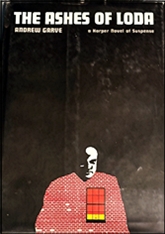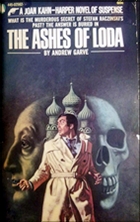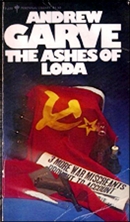Thu 9 Oct 2025
A 1001 Midnights Review: ANDREW GARVE – The Ashes of Loda.
Posted by Steve under 1001 Midnights , Reviews[5] Comments
by Newell Dunlap & Marcia Muller

ANDREW GARVE – The Ashes of Loda. Harper & Row, US, hardcover, 1965. Publisher earlier by Collins Crime Club, UK, hardcover, 1965. Popular Library, US, paperback, 1966. Perennial Library, US, paperback, 1978
Andrew Garve (a pseudonym of Paul Winterton) has produced some forty well-crafted novels of suspense. In addition to their consistent high quality, what is notable about them is their diversity, both of setting and type. Garve writes adventure, espionage, detection, and even romance with equal facility.
His stories are set in such far-flung locales as the English countryside, Australia, Africa, France, and Ireland. His heroes are often policemen or quite ordinary men who rise to meet unusual circumstances with unusual fortitude, and often his villainous characters are so finely developed as lo win the sympathy of his readers. Garve’s readers can count on a good adventure with a tantalizing central puzzle that will keep them reading until all is resolved.

The puzzle in The Ashes of Loda involves the past — specifically the war record — of a Polish chemist, Dr. Stefan Raczinski. Was he, as he claims, merely a survivor of the German concentration camp at Loda, or was he guilty of war crimes in that camp? The question threatens to tear apart the relationship of the two people who care most about him: his daughter, Marya, and her fiance, Lord Timothy Quainton.
Tim, a newspaperman normally stationed in Moscow, meets Marya while on leave in London. During their courtship he discovers an old newspaper article condemning Dr. Raczinski in absentia for war crimes. Marya adamantly ref uses to believe this, but there is enough doubt in Tim’s mind to make him launch an investigation when he returns to Russia. It is an investigation that will leave him cut off from all official help-and eventually marked for death in the middle of a Russian winter.

Garve is well acquainted with Russia and her people, since he was a foreign correspondent for the London News Chronicle in Moscow from 1942 to 1945. He puts this. knowledge to good use in this exciting story, particularly in the sequence in which Tim finds himself stranded in the countryside, trying to escape the police, foraging for the essentials, and trying to survive the deadly winter weather.
Garve’s other novels that make use of his knowledge of Russia include Murder Through the Looking Glass (1952), The Ascent of D-13, and the The Late Bill Smith (1971).
———
Reprinted with permission from 1001 Midnights, edited by Bill Pronzini & Marcia Muller and published by The Battered Silicon Dispatch Box, 2007. Copyright © 1986, 2007 by the Pronzini-Muller Family Trust.
October 10th, 2025 at 5:25 am
Garve is high up on my list of favourite authors and this is a mixture of a spy story and an adventure chase, with a little bit of detecting thrown in. Garve turns it into a compelling read.
October 10th, 2025 at 10:52 am
Thanks for the good word about Garve, Geoff. He’s another author I admit I’ve neglected over the years, in spite of all the fine things I’ve heard about his work. One cannot read everything, but in this case I think I should have tried harder.
October 12th, 2025 at 2:36 am
Garve certainly deserves a revival (along with the similar Bill Knox), in his time his works were adapted for television and at least two feature films (TWO IF BY SEA as NEVER LET ME GO with Clark Gable, Gene Tierney, and Richard Hayden about two newsmen smuggling their wartime brides out of Soviet Russia and A TOUCH OF LARCENY based on THE MEGSTONE PLOT with James Mason, Vera Miles, and George Sanders about a British Naval Officer who decides to get rich by elaborately framing himself as a Russian spy then suing the Press for Defamation when he is cleared)and often serialized in American slicks.
Garve wrote a bit of everything from heists to murder mysteries to suspense to spy stories to chase and pursuit and adventure, and most his books were compact, simple to read, and literate. He slipped easily from serious adventure to nerve wracking suspense to humorous capers.
His clarity reminded me of Dick Francis (as did his ability to ratchet up suspense) while his variety recalled Michael Gilbert (another contemporary who refused to be pigeon-holed).
I really can’t think of anyone who is his equal today at so many different types of books though the fact you never knew exactly what a Garve novel would be and his lack of series characters probably hurt him in the long run.
His books were inevitably well reviewed by a variety of genre critics and almost always perfect for big or small screen adaptation whether they got the treatment of not.
October 12th, 2025 at 8:10 pm
Right. An output of books with the same leading character certainly boosts the chances of a posthumous longevity over one without repeating characters. At least you’d think it ought to.
But after thinking about this for a while, I’ve started to wonder if the effect is all that much. After an author’s passing, even a long series of books, all withe same characters almost always starts to fade in popularity anyway.
Fairly or unfairly.
There are exceptions, of course, and these are the authors everyone remembers, even by those who aren’t even mystery fans.
October 13th, 2025 at 2:59 am
It depends on a number of factors which writers end up remembered. Series characters can help, even more if they had popular exposure in cinema or on television, but that isn’t always true.
A big bestseller that becomes a classic helps too. Despite their many successful books Geoffrey Household and John Buchan could have cruised on the basis of ROGUE MALE and THE 39 STEPS. Though there are ironic oddities like Roderic Thorp whose THE DETECTIVE was a major bestseller and a film, but who is probably best remembered for a far less read novel that became the basis for DIE HARD.
Andrew Garve had several books that sold well in the US (unlike many Brit authors he was well represented in the US with hardcover, paperback and serial representation) as well as the UK including TWO IF BY SEA, ASHES OF LODA, HERO FOR LEANDA, THE CUCKOO LINE AFFAIR, THE FAR SANDS, A HOLE IN THE GROUND, and NO TEARS FOR HILDA (Anthony Boucher always reviewed Garve well) but never became a brand named like Dick Francis. Still the same could be said of Victor Canning who would likely be forgotten here completely if not for his later best-selling Arthurian novels even though one of his books was filmed by Hitchcock.
A series character may not help much with the general public but it means something to collectors.
A good example is at one time the hard-boiled Trinity was Hammett, Chandler, and Cain, but over the years, despite best-selling books and classic movies, Cain was edged out by Ross Macdonald and Lew Archer. I can’t help but think that owed something to his having no continuing character like Hammett and Chandler.
It’s a flip of a coin who gets remembered and read, but it helps to have a familiar name and face to hang it on.